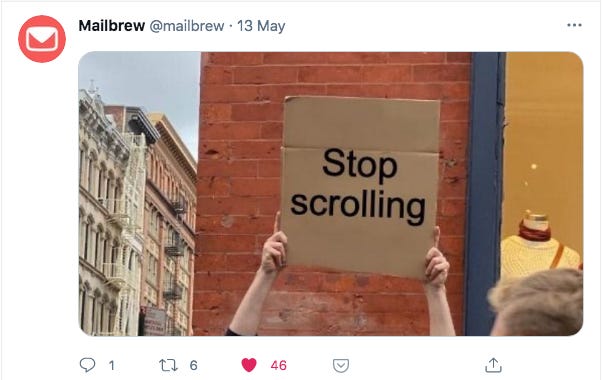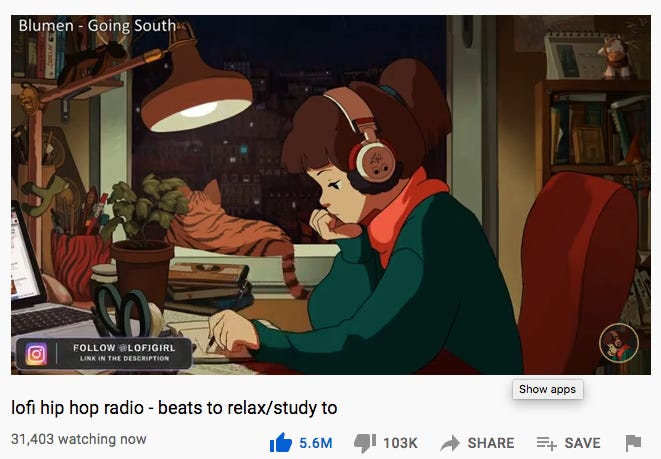How to go on a content diet | #50
Redesigning worklife
I set myself a goal at the beginning of the first lockdown to do 100 days of fitness and get out every day for a walk or run. I paid for the Peloton app, bought new running shoes and set my goals on Twitter. I’ve been on a gluten-free diet for a couple of years to help reduce inflammation in my body. I’ve prioritised my physical health and made exercise a daily habit, and I feel much better for it.
But I can’t say the same about my content diet. I’m not addicted to working, but I have an information addiction - a thirst for knowledge and curiosity about what I don’t know. I like learning new skills, going down internet rabbit holes, discovering online communities and parallel universes. I spend most of the day on my laptop and justify it as necessary as I run an online business and do social media and content for clients. It’s my job to keep up-to-date with what’s going on in the world.
I’m happy to put the hours in as I love working for myself and building digital products that scale - working towards my end goal of financial freedom. I also love the internet and enjoy working with cool people :)
‘I’m just pottering in the garden’ has become ‘I’m just pottering online’. I actually said that to my sister last night 😳
The downside of knowledge work and all this scrolling is the feeling that I’m never done. The treadmill never stops. It leaves me with low-level anxiety - have I done enough research on this topic to publish it? Could I have tackled that situation in a different way? It can leave you feeling drained even though you might not have much work to show for it (internet browser history aside!) There’s also homeworkers’ bum🔻 and mouse arm syndrome - I asked Siri to scroll a website for me this morning, but she didn’t understand. And with smartphones, work is in your pocket.
The information superhighway - we've never been so connected, but the irony is there's not that much information out there on how to manage all this information.
Grow a bigger brain and have better thinking
Polina Palinova wrote a brilliant piece last year on how to improve your content diet and says, ‘what you eat is who you are, what you read is who you become’. We spend a lot of time talking about food and celebrity chefs but far less about our information diet. She quotes NYT columnist David Brooks and his ‘theory of the maximum taste’ - the idea that your mind is defined by its upper limit - the best content it consumes and that exposure to genius has the power to expand your consciousness. You’ll grow a better brain and sharpen your thinking.
You’re not the average of the FIVE people you surround with. It’s way bigger than that. You’re the average of all the people who surround you. So take a look around and make sure you’re in the right surroundings - David Burkus.
So, the first step…
1/ A content audit - where and how am I consuming content?
Some digital gardening required.
Gmail inbox - I’ve spent hours pruning it, but it’s now back up to almost 3k emails
Social media feeds - Twitter, Clubhouse, LinkedIn, and YouTube are my main channels. Also: Reddit, Indie Hackers, Product Hunt
Newsletters - direct to my inbox and via Substack Reader
News websites
Podcasts/music/film - Apple Podcasts, Spotify, Netflix, iPlayer
Slack/Discord communities - many! Bookmarked on my laptop
iPhone - notifications are off, but I’m usually connected
2/ Setting goals
It’s not about doing a digital detox but having a better balance and a higher quality information diet. I want to read more long-form content, books, newsletters, podcasts and spend less time scrolling news feeds and Twitter - not a relaxing user experience.
3/ Paying attention to my habits and how I’m feeling
I walked to work in a cafe this week, had a massage at lunchtime, and bought a magazine, which gave me a lift. What I miss about newspapers is the feeling that you’re done - there’s nothing more to read until the next issue. I've printed out all my UX coursework to relax and read offline (all course material needs a print button). I’m also craving podcasts which I listen to when I’m walking. This tells me my information diet needs some work.
4/ Using Mailbrew
I’ve been experimenting with Mailbrew this week. Tagline: Like RSS but better. I’ve been looking for something like this for a while - Feedly is great for RSS; Substack Reader and Stoop for newsletter curation, but the UX is a bit fiddly. Mailbrew is a pleasure to use - a simple interface and easily customisable. It’s like building your own digital newspaper. I can put all my feeds in one place - calendar, RSS, newsletters, tweets from people I follow or Twitter lists - and read it as a daily digest in my inbox at 9 am. I also like how the emails are numbered, Digest #2.
I’m not the only one who’s excited about this product. David Heinemeier Hansson, the founder of Basecamp says he’s leaving Twitter to use Mailbrew. But then he’s using Twitter as a content feed more than for social interaction.
Of course, it’s an artificial construct - I can jump online at any time if I want to be social which is what ‘social’ media is for after all, but let’s see if it recreates the sense of finishing and gives me back more time and control.
Thinking about UX, I’m trying to design my day and curate my environment for better ideas and creative thinking. To be more intentional with my time and habits, and use the internet as a tool more than entertainment - hard when you’re using the same devices for both. Roll on the tiny inbox - from 🍕 to 🍉 and a sharper 🧠
A friend ditched her iPhone for a Doro flip phone - she loves the simplicity and accessibility of the design, and the satisfying snap - DONE. She said she feels more relaxed during the day. In his book Digital Minimalism, Cal Newport talks about an underground movement of executives that use dumbphones like the Doro. For the most part, in finance, i.e. hedge fund managers are moving millions of dollars in high trades every day. Hence, it helps to shield yourself from distractions of market information that could bias decisions and cost money.
Not ready to give up my iPhone, but I can see the benefits of switching between the two or using separate devices for work.
I’m also going to buy a wall planner and stick work and personal goals on it so they’re visible - something Steph Smith talked about last week which made me think. We’re great at creating to-do lists for work, but how often do we track our personal goals?
How are you going to improve your content diet this year?
Goings-On(line)
Fascinating finds from around the web.
🗞 Your personal daily newsletter(Mailbrew - my affiliate code) - free to use with premium features.
🍉 How to go on an information diet(Ness Labs). This is the first time in history that humans have been exposed to such a constant flow of information and our brains can't cope with it. Simple ways to deal with overconsumption based on the Michael Pollan Diet: ‘Eat food, not too much. Mostly plants’. For information: ‘Seek. Not too much. Mostly facts.’
📬 How to improve your content diet in 2021(The Profile). One of the biggest discoveries I've made in the last few years is simple but overlooked: What you eat is who you are, and what you read is who you become.
📚 The Information Diet(Clay Johnson) on the role information has played throughout history. How to stay smart, productive, and sane. He managed the online part of President Barack Obama's first campaign for the White House.
📹 The challenge that fixed how I consume online content(My Student Voices) - Diogo Lança’s extreme experiment to tackle his YouTube binging.







